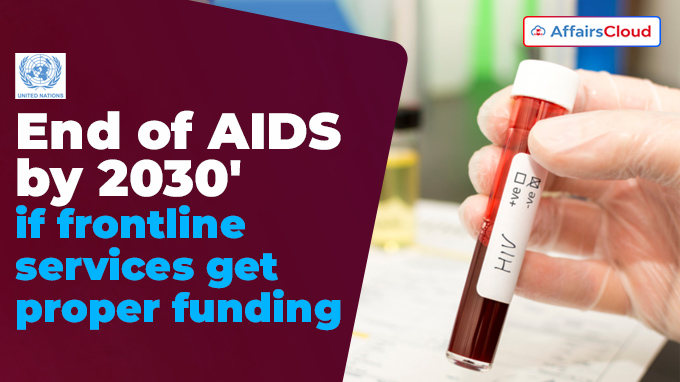 Ahead of World AIDS Day 2023 (1 December 2023), the Joint United Nations Programme on Human Immunodeficiency Virus (HIV)/Acquired Immunodeficiency Syndrome (AIDS) (UNAIDS) released the World AIDS Day Report 2023, titled “Let Communities Lead”.
Ahead of World AIDS Day 2023 (1 December 2023), the Joint United Nations Programme on Human Immunodeficiency Virus (HIV)/Acquired Immunodeficiency Syndrome (AIDS) (UNAIDS) released the World AIDS Day Report 2023, titled “Let Communities Lead”.
- The report states that AIDS can be ended as a public health threat by 2030, if only frontline communities get full support from governments and donors.
- The report was launched in London, United Kingdom (UK) at a World AIDS Day event hosted by STOPAIDS, a civil society organization.
- The 2023 theme of World AIDS Day is “Let Communities Lead”.
About the Report:
i.The report underscores the pivotal role of community-led interventions in achieving the end of AIDS and ensuring sustained progress.
ii.The report is “an urgent call to action for governments and international partners to enable and support communities in their leadership roles”.
Analysis of the report:
i.Globally, 39 million people were living with HIV in 2022.
- 9.2 million people living with HIV do not have access to lifesaving antiretroviral therapy.
- 53% of all people living with HIV were women and girls.
ii.Community-led advocacy has paved the way for investments required to reach 29.8 million people with HIV treatment services by the end of 2022.
iii.New HIV infections have been reduced by 59% since the peak in 1995.
- In 2022, 1.3 million people were newly infected with HIV, compared to 3.2 million people in 1995.
iv.AIDS-related deaths have been reduced by 69% since the peak in 2004 and by 51% since 2010.
- In 2022, around 6,30,000 people died from AIDS-related illnesses worldwide, compared to 2.0 million people in 2004 and 1.3 million people in 2010.
v.Since the start of the COVID-19 pandemic, 85.6 million people have become infected with HIV and 40.4 million have died from AIDS-related illnesses.
vi.In 2022, HIV programs in low- and middle-income countries had USD 20.8 billion, a 2.6% decrease from 2021.
- However, this falls significantly short of the USD 29.3 billion required by 2025.
Note:
i.In 2015, the UN established the target of eliminating AIDS as a public health threat by 2030.
ii.In 2021, UN high-level meeting on AIDS adopted a political declaration which include that by 2025, community-led organisations should deliver:
- 30% of testing and treatment services.
- 80% of HIV prevention services for high-risk populations at high risk of infection.
- 60% of programs support societal changes that enable an effective and sustainable HIV response.
Recent related News:
UNAIDS, the Joint United Nations (UN) Programme on Human Immunodeficiency Viruses (HIV)/Acquired Immune Deficiency Syndrome (AIDS) report, titled “2023 UNAIDS Global AIDS Update – The Path That Ends AIDS” highlights that there is a path to end AIDS by 2030 and it requires strong political leadership, following the science, tackling inequalities and ensuring sustainable funding.
About UNAIDS:
Executive Director– Winnie Byanyima
Headquarters– Geneva, Switzerland
Started Operations in– 1996




